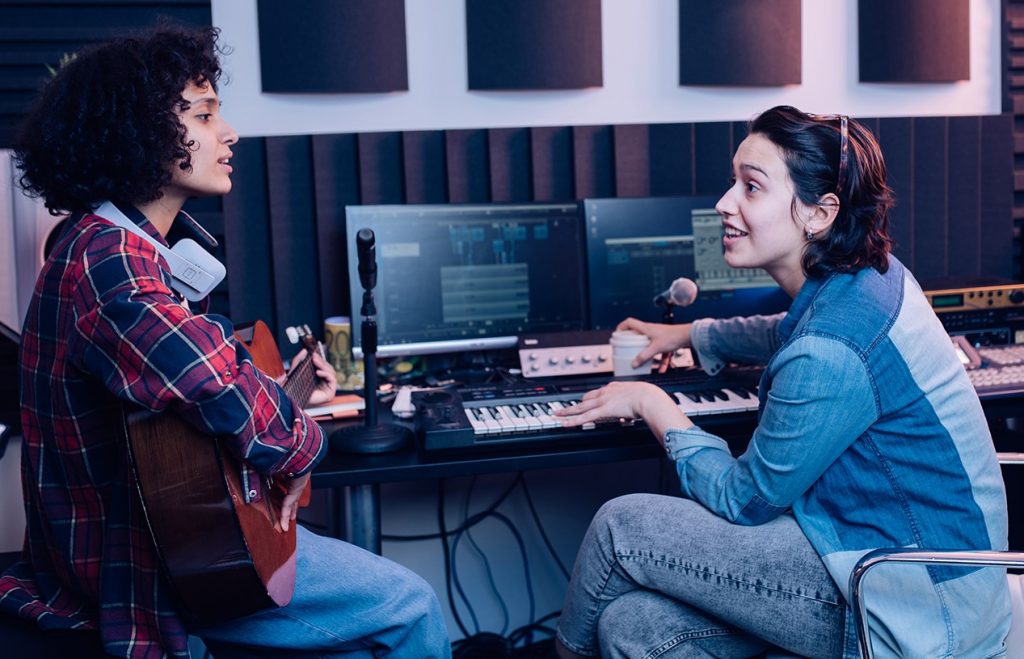Music and The Brain
Here’s why music is good for both your health and your emotional well-being.
Listening to and playing music is an enjoyable activity for just about all of us. It turns out that not only is it fun, but it’s good for your health and emotional well-being too.
For decades, scientists, psychologists and other experts have been studying the value of musical activity, and they have reached some surprising conclusions, such as:
- It supports concentration, focus and memory
- It helps develop and/or maintain motor skills
- It sharpens children’s listening skills and aids in language learning and reading
- Children who play a musical instrument perform better at testing in math, science and other fields, and generally excel more in school
- It helps elevate mood and reduce depression
- It lessens stress and aids in physical healing
- Learning an instrument fosters a feeling of accomplishment and encourages creative thinking
In this article, we’ll explore these benefits more deeply.
Your Brain and Music
Common wisdom used to be that music was processed only by the right side of the brain — the area that deals with creativity and emotion. In recent years, this has been upended, as explained by neuroscientist and fellow Yamaha blogger Dr. Daniel J. Levitin in his acclaimed book This Is Your Brain on Music. “Contrary to the old, simplistic notion that art and music are processed in the right hemisphere of our brains, with language and mathematics in the left,” he writes, “recent findings … are showing us that music is distributed throughout the brain. Music listening, performance and composition engage nearly every area of the brain that we have so far identified, and involve nearly every neural subsystem.” This online presentation from the Kennedy Center breaks that down clearly.
To better understand this, let’s look at how the brain is occupied and exercised when you play a keyboard instrument like piano. Knowing where to place your hands on the keys and how to jump to notes outside that hand position — often without looking — requires spatial coordination and memory. Motor skills and decision-making are needed to determine how to use your fingers, and how to control rhythm and maintain hand independence. (In fact, no other instrument makes use of all ten fingers as intricately as the keyboard does.) The visual cortex is involved when reading written music and translating that to actions, and memory comes into play when the performer no longer requires the written music. Auditory processes are engaged when learning a piece of music by ear, and in listening to and reacting to the sound produced to help guide decisions about notes, rhythm and dynamics. And the right foot needs to be controlled at the same time as the hands to operate the sustain pedal. Talk about firing on all cylinders!
While all this is happening, the player is getting feedback from what they’re hearing, and if it is deemed as being good, it lights up the brain’s reward system; if not, it triggers a different reaction and emotion. This complex whole-system activity for the brain makes playing a musical instrument one of the most complete and enriching activities you can engage in.
Not only are all these areas of the brain occupied when making music, but prolonged activity strengthens and grows the areas used. This physical change in the brain is called neural plasticity. In other words, you can actually improve your brain by playing an instrument … a benefit that few other activities can deliver.
Early Childhood Learning
The many rewards of starting a child playing a musical instrument at a young age are well-documented. Learning an instrument fosters a feeling of accomplishment for the player, and helps to develop motor skills, concentration and creative thinking — all fairly obvious benefits. But it can also help develop better reading, language and cognition skills. A landmark study conducted in 2018 showed that students who received piano instruction along with their regular reading studies outperformed students who received only extra reading support for the same amount of time. As MIT neuroscientist Dr. John Gabrieli concludes in this blog posting, “These findings bring scientific precision to the question as to whether piano training provides benefits beyond musical experience. It appears that some of the auditory skills learned from piano playing enhance specific aspects of the perception of spoken language, even beyond that gained from additional experience in reading.”
School systems in many parts of the country have observed benefits to kids being involved in music programs. An organization called Save The Music reports that ELA scores (English Language Arts, which includes reading and writing) improved between 2 to 5% for students involved in music programs. The Arts Education Partnership has found that students in ninth grade with music instruction performed significantly higher on algebra assignments than non-musicians, and high school band students consistently test higher in English, math and biology.
Stress Reduction and Mood Improvement
Music is able to convey a wide range of emotions, and so can help to support or even change one’s mood for the better. Our emotional state can affect our physical state, so being able to reduce stress, for example, is a clear health benefit.
Dr. Barry Bittman, Chairman and CEO of the Yamaha Music and Wellness Institute, said in a recent interview that the organization’s research teams have uncovered extensive evidence suggesting that expressing one’s self creatively reduces the impact of stress on many levels. Music triggers chemical responses in the brain that improve mood and reduce anxiety, as well as inducing pleasure, joy and motivation. At the same time, it boosts your immune system and can help relieve pain, including the misery of migraines and chronic headaches. Relaxing music can lower high blood pressure, too; listening to it before bedtime can even alleviate sleeping problems. “Recreational music-making reduces the impact of stress on many levels and allows healing to begin,” adds Dr. Bittman in an article on the benefits of playing piano. “It actually alters gene expression pathways in patients with coronary heart disease.”
Taking the Leap from Listening to Playing
As Daniel Levitin points out in This Is Your Brain on Music, music-making was once a common activity in families and at gatherings like parties. Over time, however, society started to judge player’s abilities more and more, making a distinction between players and listeners. “[But] I would say that most Americans qualify as expert music listeners,” Levitin states. “We have the cognitive capacity to detect wrong notes, to find music we enjoy, to remember hundreds of melodies, and to tap our feet in time with the music.”
Taking the leap from “just” listening to playing a musical instrument for pleasure and shared social experience is actually a small step, and it’s one that should be taken without fear of judgment or criticism. We can use our innate music-making ability to support (or even to change) our emotional state in healthy and healing ways, while at the same time growing our brain. Win/win!















